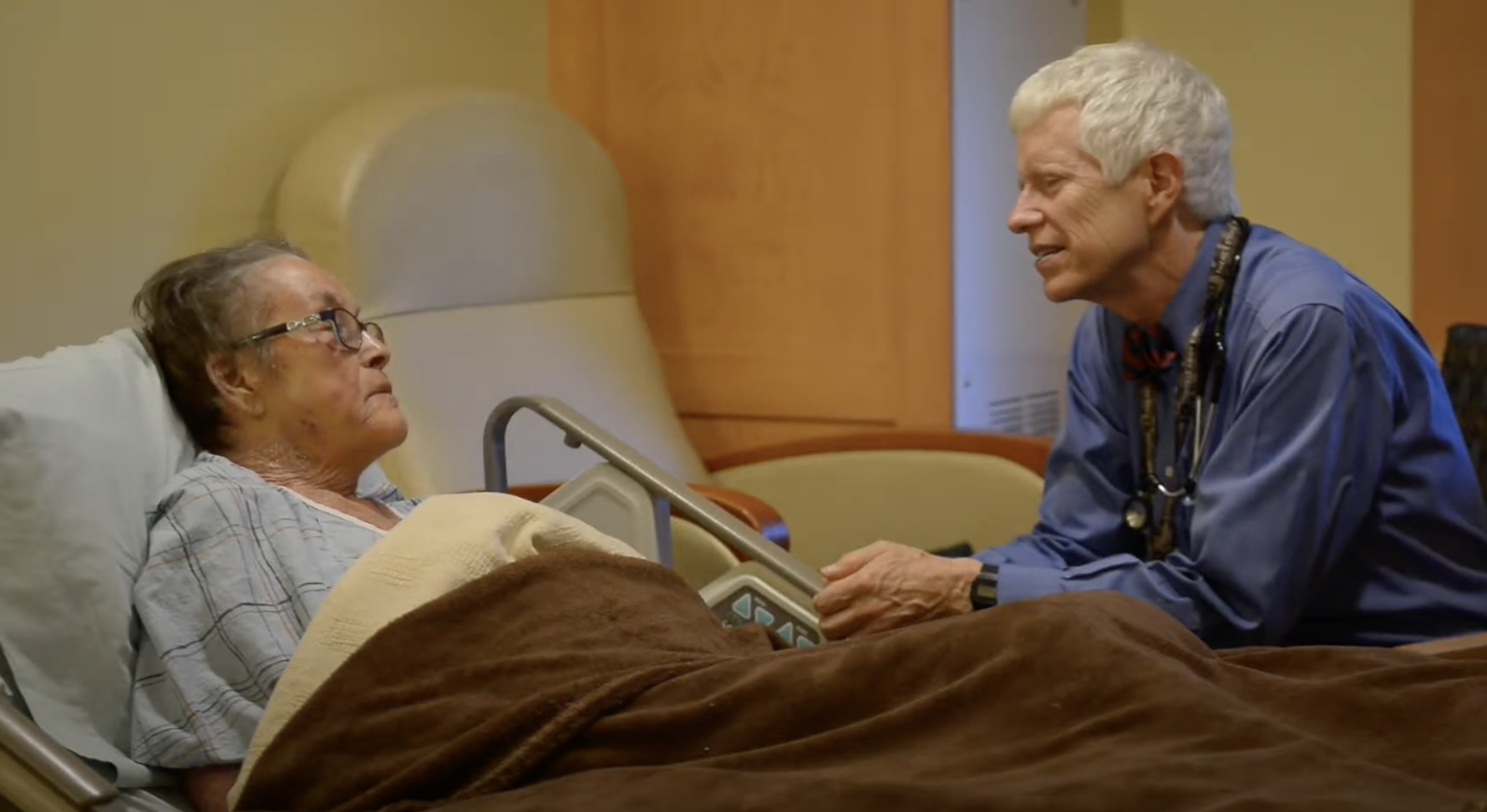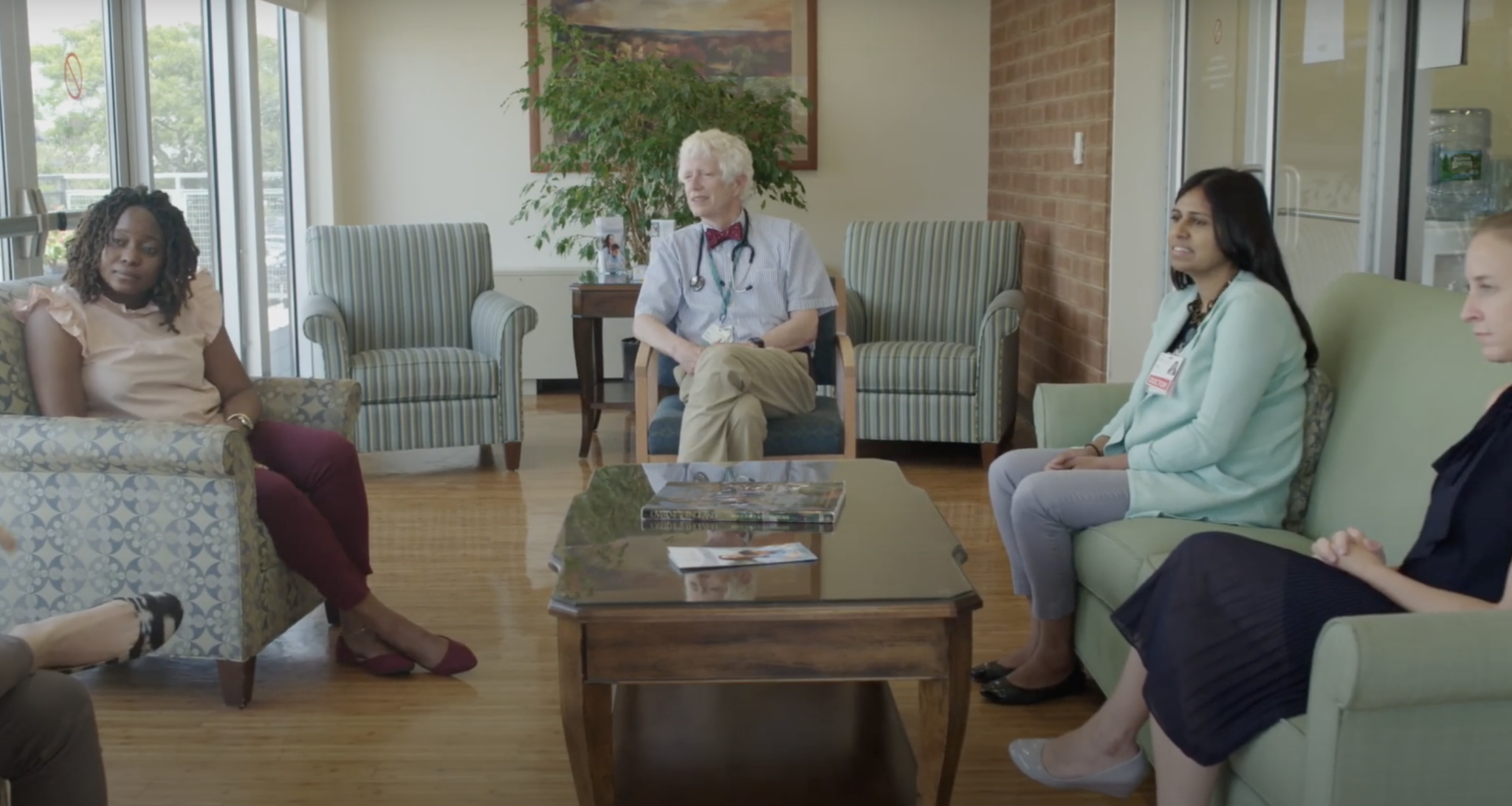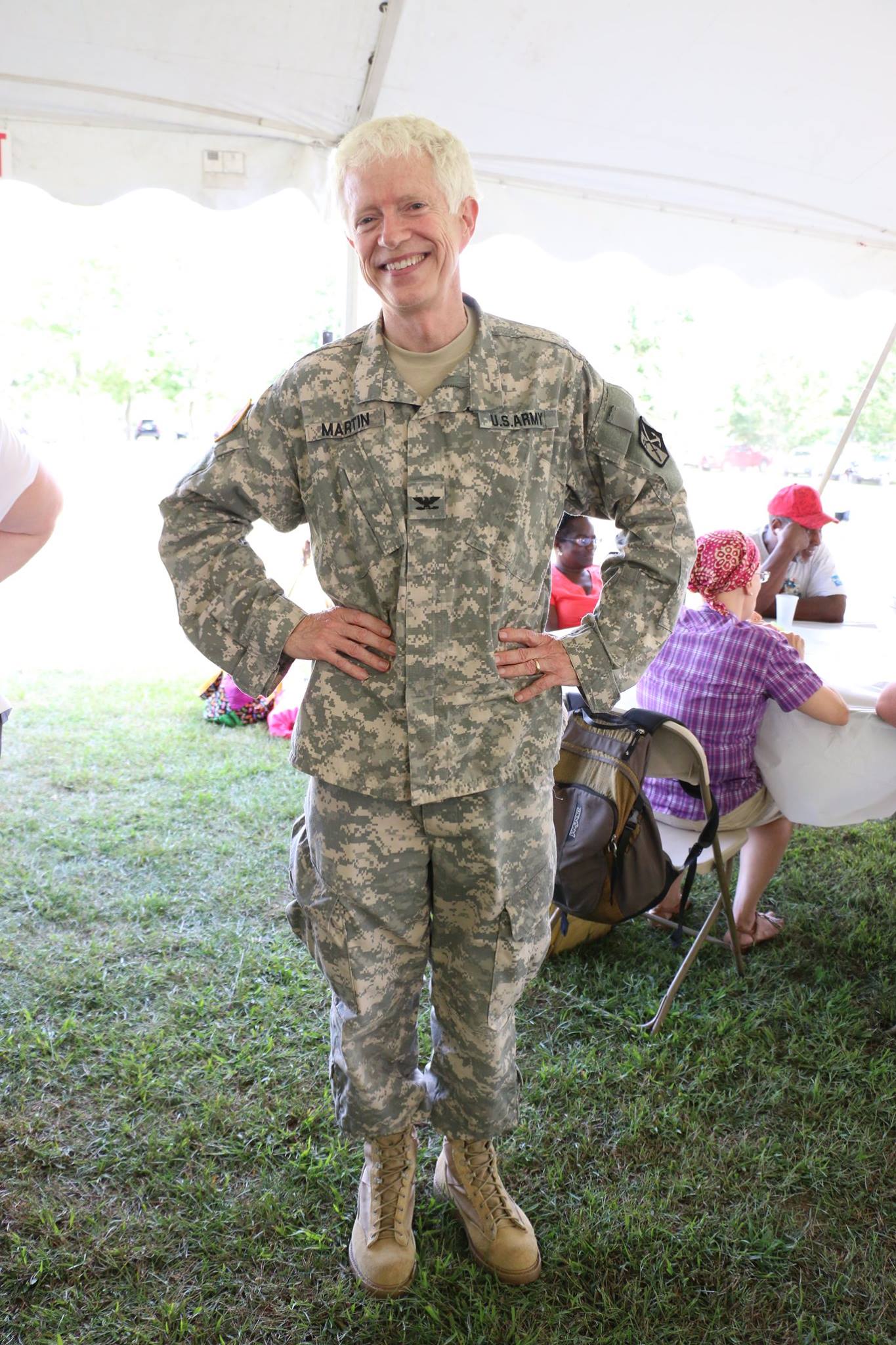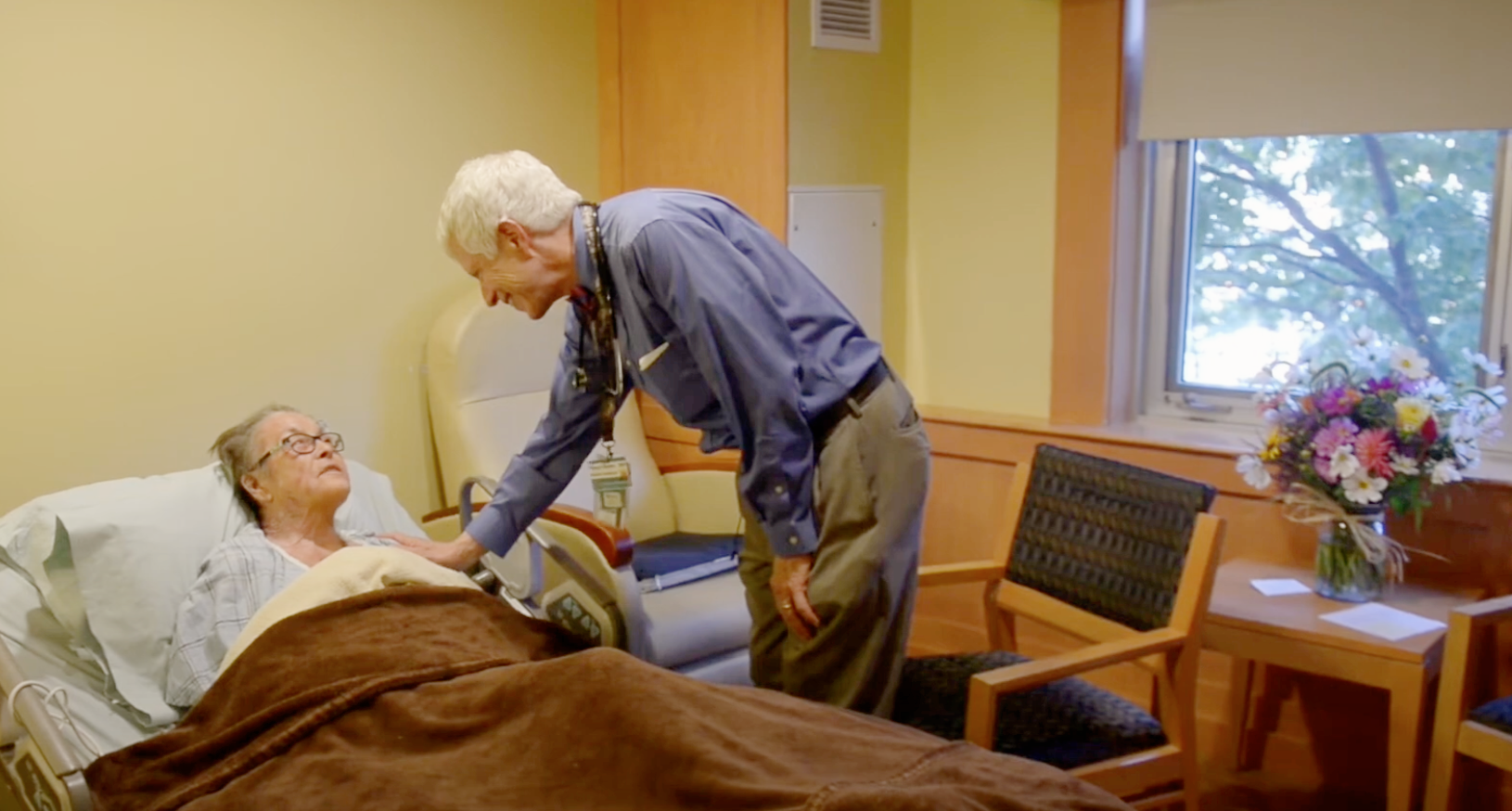“I’ve always said this is the job I’d do if I won the lottery,” says Edward W. Martin, MD, MPH, HopeHealth’s chief medical officer. “I love my work.”
In his 35 years at HopeHealth, Dr. Martin has changed this organization.
And in return, it’s changed him.
Here’s how.
How did you arrive at HopeHealth?
Dr. Martin: In 1987 I was just out of my residency, doing primary care and some geriatrics work at Eleanor Slater Hosptial. A few of my patients were on HopeHealth’s hospice service. The care was so excellent — I thought so speaking to the nurses, and I heard it from the families.
A friend mentioned that the hospice program was looking for some physician help. I reached out, and the rest is history.
Hospice cares for patients and families through some of life’s most challenging moments. What’s one of the biggest lessons you’ve learned over the years?
The importance of presence.
When I started, if I saw someone going through something awful, I wouldn’t want to mention it. My instinct was to avoid it. I didn’t want to upset them.
Now I know that it’s okay to reach out. Don’t worry about saying the wrong thing — just your presence, your support, is so important.

How has this work impacted you personally?
Without hospice work, I think I would’ve been a very different person. It has changed me in so many ways. It’s made me more open. It’s changed my relationship with my family.
I vividly remember a home visit that I made early in my career. We helped a patient come home from the hospital, so we could fulfill his wish to be extubated and allowed to die. Father’s Day was coming up. As this patient took his final breaths, his daughter sat beside him, reading aloud the card she’d written for him. She told him in great detail what a great father he had been, how she had always loved and admired him and how much he had meant to her.
Driving home, I thought about the Father’s Day card I had stamped and ready to go for my own father. My “have a great day, see you soon” message seemed embarrassingly inadequate. When I got home, I rewrote it. I said all the things I’d left unsaid over the years — not just how much I loved my father, but the things I wanted him to know about the role he played in my life, my career choice, and my approach to patients.
I don’t think I ever really told my parents “I love you” until then.
As HopeHealth’s chief medical officer, you still work directly with patients — along with countless other responsibilities. What are some of the most fulfilling parts of your day-to-day?
For me, the most gratifying thing in medicine has always been the relationships with patients and families.
I’ve continued to care for patients in the HopeHealth Hulitar Hospice Center. And I continue to make home visits. It’s amazing seeing people in their own environment. Oftentimes you’re sitting in their living room, surrounded by pictures of weddings, graduations and other important moments. It’s a window into their lives.
I also love teaching. In 2012 we created a fellowship in palliative medicine. I recently handed over the reins for running that program, but I’m still very involved in teaching the fellows. In hospice, I rarely have a day when I don’t have a medical student or resident working with me.

How do your medical students and residents react to hospice care?
Some of them were dreading coming here. They think, “I’m going to a place where there are all these dying patients.”
Then they go into the rooms and talk to families. Some families really appreciate the chance to share stories about their mom or dad or spouse. This is not just a person in a bed, it’s a person with a wonderful, rich life. They’ll tell students, “The staff here is so kind and dedicated. Mom is getting the best care we’ve ever seen.”
By the time we finish seeing patients, most medical students and residents have a very different view of hospice. One student said, “I thought this was going to be one of the worst days of my medical career — and it was one of the best.”
You also talk to students about the importance of taking care of yourself outside of medicine. How does that look for you?
I’m a fanatic about exercise. Usually, I’m up running early every morning before coming to work.
I’m passionate about ballroom dance too. My wife and I have over 20 years competing and performing. That’s starting up again since the pandemic. We recently competed in the waltz and two-step.
The other thing that not everyone knows: Throughout most of my HopeHealth career, I also had a 30-year career in the military. I joined the U.S. Army Reserve in 1989 and served through 2019. My deployments were in the U.S., often taking care of soldiers who were returning. It was a big part of my life.

How has the field of hospice and palliative care changed over the past 35 years?
Now it’s seen as mainstream medical care. That wasn’t the case in 1987 when I got started.
In 1993, when HopeHealth opened one of the country’s first inpatient hospice units, it was a huge step forward. Prior to that, patients who struggled at home were dying in hospitals or emergency rooms, because they really didn’t have any other options.
Beginning in 2008, we started a palliative care consultation service, first at The Miriam Hospital and then Rhode Island Hospital — at the time, it was just me and a nurse practitioner. Things have grown considerably since then.
It’s been gratifying to see steady growth and acceptance for hospice and palliative care, both from the medical community and society in general. I think HopeHealth has been a big part of that. We’ve always been a leader in these crucial fields of care.
Speaking of leadership: HopeHealth’s response to COVID-19 went above and beyond other health systems’. What drove that response?
The COVID outbreak was such a difficult time in nursing homes and inpatient units. There was so much fear. A number of hospice programs in the country wouldn’t accept COVID patients in their inpatient settings. Families couldn’t be at the bedside; you might get a 5-minute FaceTime visit to say goodbye.
But at HopeHealth, we made a commitment to accept COVID patients and have visitation.
I think hospice has always been about making sure that patients are surrounded by the people they love, whether be it at home or in a nursing home or here in our inpatient unit. Even during the first part of the pandemic, HopeHealth worked closely with the health department to make sure that happened safely. I had primary responsibility for our inpatient COVID patients. Our staff really rose to the challenge.
Even today, I still hear feedback that other settings were so grateful that we served COVID patients throughout the pandemic.
You’ve received lots of awards over the years, including the Distinguished Hospice Physician Award from the American Academy of Hospice and Palliative Medicine. How does that feel?
It’s clearly not just a recognition of my work, but the work of our team. The people I work with make me look good. I often get credit for the incredible things that we’ve done together.
When I started at HopeHealth, I was pretty much the only physician. Over the years, we’ve been able to attract a great group, from clinical to administrative staff. We have an excellent volunteer program. I can’t think of another grief support program in the country that’s as rich and deep as ours. I could go on.
I don’t see the kind of turnover here that I see in other health systems. Many times, staff come here and say, “This is really where I belong. This is the kind of work I want to do.”
I know the feeling. I’ve been so honored to work with such an excellent team. This has been the most consistently rewarding and gratifying work I’ve done in medicine.

